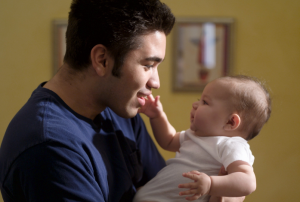
Source: Fjalar Writes
Originally published on Role/Reboot and cross-posted here with their permission.
As a culture, we understand that many teen moms need help to develop good parenting skills and improve the lives of their children. Why do we think teen dads don’t need that same help?
Teens who become parents usually spend most of their adulthood in or near poverty. So do their kids, of course.
We know that growing up in or near poverty makes it harder for kids to reach their own potential. It also increases the odds that their kids will become teen parents, furthering the cycle of poverty and compounding the problem.
Teen mothers have a difficult path to travel. Compared to other girls their age, they often have lower grades, are less likely to graduate high school (on time or ever), and are less likely to attend or graduate college.
Given the connection between education and income, it should not be a surprise that they earn less money as adults and are more likely to receive some type of public assistance than other women their age.
When we talk about teen moms, we rarely talk about the guys who got them pregnant. The majority of these dads are also teens. The mothers certainly have it bad. So do the fathers.
Like the girls and young women they’ve impregnated, these boys and young men experience the same poor educational outcomes — poorer grades, less likelihood of completing high school, and lower rates of college attendance or completion. They also have higher rates of under- and unemployment than their age-mates and, even when they do have full time jobs, they tend to earn less than other guys their age.
Although some teen fathers do receive public assistance, most don’t because they are not custodial parents and thus are ineligible. Unlike young women who become parents as teens, young men who become fathers as teens are more likely to spend time in jail than their age-mates.
Like teen moms, teen dads are more likely to have grown up in or near poverty.
Statistically, Blacks and Latinos are over-represented among teen fathers, but it’s not just a problem for people of color. Just under half of teen fathers are White.
This is not a small problem.
Federal studies indicate approximately 180,000 teen boys become fathers every year. Most are 18 or 19 when their (first) child is born, but some are younger.
The vast majority understand their fatherhood in patriarchal stereotypes of maleness: Their primary role is to earn money and help out with the child (and house). However, it’s not clear how much of their beliefs are the result of how they were raised and how much is due to the realities and practicalities of being a teen parent.
It doesn’t need to be this way.
I spoke with Mark Kiselica, author of “When Boys Become Parents: Adolescent Fatherhood in America” and Provost of Iona College. Kiselica told me teen fathers are “greatly misunderstood” and that “we need to think complexly about them and raise awareness about their complicated lives.”
There are several things we can do to help:
1. Lose the Promiscuity Stereotype
The American public generally views teen fathers as irresponsible guys who were just screwing around and ended up getting someone pregnant.
The reality is that most teen fathers impregnated their girlfriends and that the majority of these couples were together for at least a year prior to pregnancy.
2. Lose the Deadbeat Dad Stereotype
The American public assumes that teen boys are not interested in being involved parents and points to statistics about uninvolved fathers who don’t see their kids and may or may not pay child support. Again, the reality is quite different.
Most teen boys want to be involved with their children. Many respond to (impending) fatherhood by vowing to be a good father, if not also a good partner to their child’s mother.
3. Lose the Moral Judgments
You may or may not see life in poverty as some type of “appropriate” consequence for teens who had unprotected sex. I’ll admit I don’t understand that calculus, but I’m not clear how or why the consequence of poverty should extend to their child.
4. Help Them Provide for the Kid and Their Partner
For better or for worse, the majority of teen dads view parenting in patriarchal and gender-binary terms: He’ll be the breadwinner, and she’ll be the caretaker.
Given all the focus on deadbeat dads, as well as the fact that most teen moms live with their parents (or other family members), young dads have plenty of reason to think money is the primary metric by which they’ll be measured.
Yet decent paying jobs are few and far between for teen boys who “only” have a high school diploma or GED, and the odds are even worse for those who don’t.
Consequently, meeting child support expectations can be difficult for some young fathers, especially those who have been incarcerated for some reason.
Laws that penalize young men who fall behind in paying child support by taking away their driver’s licenses make it that much more difficult.
If we want these young men, their partners, and their kids to get out of poverty, then we need to help them enter fields that will pay them a decent wage and provide them with direct connections to employers who understand the needs of parents, like flexible scheduling.
5. Help Them Become Good Fathers
Try to find a parenting program for teen dads in your area.
Go ahead, do the web search. I’ll wait.
You probably did not find anything male-specific, unless you’re in a major metropolitan area, in which case you might have found just one.
Despite all of the gender-based socialization that encourages young women to take care of others, gives them dolls as presents, and sets up their first jobs as babysitters, our culture understands that many teen moms need more support to develop good parenting skills. They still need help learning how to read their baby’s signals, understand the child’s nutritional needs, and be a good parent.
Why do we think teen dads don’t need that same information?
6. Help Them Be More Flexible
If there’s one thing parents know, it’s that parenting requires flexibility.
Young children’s needs, schedules, and moods change all the time, and parents need to be able to respond appropriately. As there’s no rational conversation with a newborn or a two-year-old, parents need to be intuitive and attentive to their children.
Male socialization and many boy-typical activities, especially sports and video games, are based on unchanging rules. So are some conceptions of gender roles.
When working with young fathers, it’s important to help them understand the need for flexibility and teach them how to talk through and negotiate those moment-to-moment and week-to-week changes with their partner.
That means allowing for a flexibility in gender roles that shifts him from “helping” or “babysitting” to “parenting.”
7. Help Them Avoid Having More Kids
We know that each additional child increases the odds that the entire family will remain in poverty, thus increasing their cost to society.
Yet access to, and cost of, birth control can be prohibitive for folks in or near poverty, which is one of the reasons the American Association of Pediatrics has stated that condoms should be available at little or no cost to adolescents who need them.
Even though women who already have at least one child and say they can’t handle (or afford) another child are the group most likely to seek an abortion, access to safe abortion is even more difficult.
Since we know teen dads (and moms) are not going to stop having sex, why do we want to make it difficult for them to avoid pregnancy?
For a fictionalized first-person account, read the two part story here and here.
[do_widget id=”text-101″]
Andrew Smiler, PhD is a therapist, evaluator, author, speaker residing in Winston-Salem, North Carolina (USA), and the author of “Challenging Casanova: Beyond the stereotype of promiscuous young male sexuality” and co-author, with Chris Kilmartin, of “The Masculine Self (5th edition)”. His research focuses on definitions of masculinity and he studies normative aspects of sexual development, such as age and perception of first kiss, first “serious” relationship, and first intercourse among 15-25 year olds. Follow him@AndrewSmiler.
Search our 3000+ articles!
Read our articles about:
Our online racial justice training
Used by hundreds of universities, non-profits, and businesses.
Click to learn more
Most Read Articles
- « Previous
- 1
- …
- 30
- 31
- 32



















